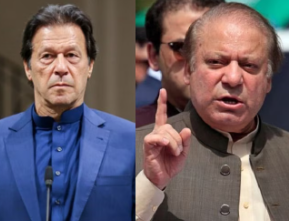Manas Dasgupta
NEW DELHI, Dec 30: Amidst the current political and economic upheaval, Pakistan’s Election Commission dealt a major blow to the Pakistan Tehreek-e-Insaaf (PTI), one of the main contenders for power in the coming general elections, by rejecting the nomination of the former prime minister Imran Khan, the party’s mainstay to earn votes.
His party’s media team and the official sources have confirmed that Pakistan’s election body has rejected the cricketer-turned-politician’s nomination to contest the national elections to be held on February 8, 2024, from two constituencies. But under similar circumstances, the nominations of another former prime minister Nawaj Sharif have been accepted by the election commission.
The 71-year-old former cricket star has been embroiled in a tangle of political and legal battles since he was ousted as prime minister in April 2022. He has not been seen in public since he was jailed for three years in August for unlawfully selling state gifts while in office from 2018 to 2022.
Khan has been disqualified from contesting the national elections because of the corruption conviction, but he nevertheless filed nomination papers for the elections on Friday, his media team said.
In a list of rejected candidates from Lahore, the Election Commission of Pakistan said Khan’s nomination was rejected because he was not a registered voter of the constituency and because he is “convicted by the court of law and has been disqualified.”
His media team said the commission had also rejected his nomination to contest the elections from his hometown, Mianwali.
Khan, who was widely seen as the country’s most popular leader, said he was being targeted by the powerful military to keep him out of the polls. The military has denied it. Last week, a high court refused to suspend Khan’s disqualification from contesting the elections.
In addition to Khan, the election commission has also rejected nomination papers submitted by some other senior PTI leaders including the former minister Shah Mehmood Qureshi, vice chairman of Khan’s party.
While rejecting Imran’s nomination, the election commission accepted the nomination of another controversial candidate, also former Prime Minister Nawaz Sharif, from two constituencies for the 2024 elections. Though a court has overturned two graft convictions against Sharif, he would still need a life ban on holding any public office to be removed to qualify to stand, so it was not immediately clear how his nomination was accepted. A hearing on that ban will be held in January.
Sharif was banned from running in elections in 2017 by the Supreme Court, which declared him dishonest for not disclosing income from a company owned by his son. Sharif, who arrived back home in October from four years of self-imposed exile in Britain, is bidding for a fourth premiership in the February elections. His biggest challenge will be to wrest back his support base from Khan.
Despite being disqualified from contesting the upcoming general elections, Imran Khan submitted his nomination papers from his home constituency in Mianwali on Friday only to be rejected hours later. Khan has been at the centre of a political crisis since he was ousted in a parliamentary no-confidence vote in April 2022. Khan is seeking to overturn the conviction for selling gifts he received as he prime minister instead of depositing the same in the government treasury for which he was barred from contesting elections for five years. He filed a plea in the Islamabad High Court, but it was rejected, after which the party moved to the Supreme Court. In a separate victory for his legal team, they managed to get him bail from the apex court earlier in the day; however, the incarcerated former PM still won’t be able to come out of jail anytime soon as he was arrested in two more cases during his incarceration.
The top two issues that the incoming government will have to deal with are economic stabilisation and political uncertainty, both of which have been persistent since PTI’s ouster. Several poll surveys have indicated that a coalition would rule the country as no single leader or party seemed to be in a position to get a clear majority.

